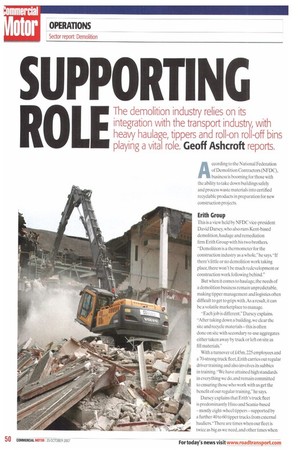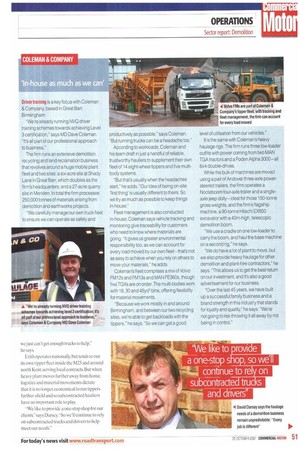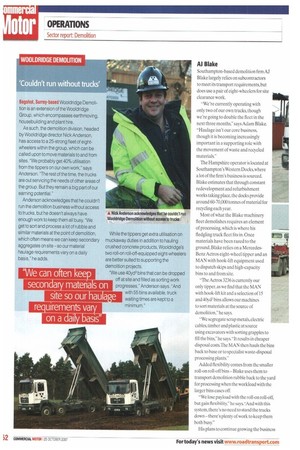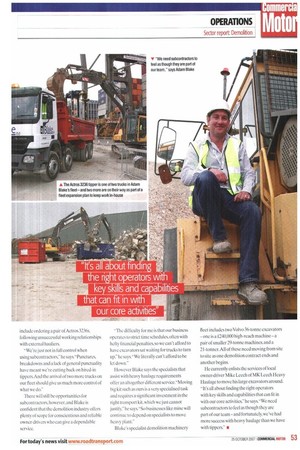SUPPORTING
Page 50

Page 51

Page 52

Page 53

If you've noticed an error in this article please click here to report it so we can fix it.
ROLEThe he demolition industry relies on its integration with the transport industry, with heavy haulage, tippers and roll-on roll-off bins playing a vital role. Geoff Ashcroft reports.
According to the National Federation of Demolition Contractors (NFDC), business is booming for those with the ability to take down buildings safely and process waste materials into certified recyclable products in preparation for new construction projects.
Erith Group 'this is a view held by NFDC vice-president David Darsey, who also runs Kent-based demolition, haulage and remediation firm Erith Group with his two brothers "Demolition is a thermometer for the construction industry as a whole," he says."If there's little or no demolition work taking place, there won't be much redevelopment or construction work following behind."
But when it comes to haulage, the needs of a demolition business remain unpredictable, making tipper management and logistics often difficult to get to grips with.As a result, it can be a volatile marketplace to manage.
Each job is different," Darsey explains. "After taking down a building. we clear the site and recycle materials— this is often done on site with secondary re-use aggregates either taken away by truck or left on site as fill materials" With a turnover of £45m, 225 employees and a 70-strong truck fleet, Erith carries out regular driver training and also involves its subbies in training."We have attained high standards in everything we do, and remain committed to ensuring those who work with us get the benefit of our regular training," he says.
Darsey explains that Erith's truck fleet is predominantly Hino and Scania-based —mostly eight-wheel tippers —supported by a further 40 to 60 tipper trucks from external hauliers. "There are times when our fleet is 4t....atbig, twice as big as we need, and other times when we just can't get enough trucks to help." he says.
Erith operates nationally, but tends to run its own tipper fleet inside the M25 and around north Kent, serving local contracts. But when heavy plant moves further away from home, logistics and material movements dictate that it is no longer economical to run tippers further afield and so subcontracted hauliers have an important role to play.
"We like to provide a one-stop shop for our clients," says Darsev. -So we'll continue to rely on subcontracted trucks and drivers to help meet our needs."
Al Blake
Southampton-based demolition firm AJ Blake largely relies on subcontractors to meet its transport requirements, but does use a pair of eight-wheelers for site clearance work.
-We're currently operating with only two of our own trucks, though we're going to double the fleet in the next three months," says Adam Blake. -Haulage isn't our core business, though it is becoming increasingly important in a supporting role with the movement of waste and recycled materials."
The Hampshire operator is located at Southampton's Western Docks, where a lot of the firm's business is sourced. Blake estimates that through constant redevelopment and refurbishment works taking place, the docks provide around 60-70,000 tonnes of material for recycling each year.
Most of what the Blake machinery fleet demolishes requires an element of processing. which is where his fledgling truck fleet fits in. Once materials have been razed to the ground, Blake relies on a MercedesBenz Actros eight-wheel tipper and an MAN with hook-lift equipment used to dispatch skips and high-capacity bins to and from site.
"The Actros 3236 is currently our only tipper, as we find that the MAN with hook-lift kit and a selection of 15 and 40yd3 bins allows our machines to sort materials at the source of demolition," he says.
"We segregate scrap metals, electric cables, timber and plastic at source using excavators with sorting grapples to fill the bins," he says. "It results in cheaper disposal costs.The MAN then hauls the bins back to base or to specialist waste-disposal processing plants."
Added flexibility comes from the smaller roll-on roll-off bins -Blake uses them to transport demolition rubble back to the yard for processing when the workload with the larger bins eases off "We lose payload with the roll-on roll-off, but gain flexibility,he says. "And with this system, there's no need to stand the trucks down-there's plenty of work to keep them both busy."
His plans to continue growing the business include ordering a pair of Actros 3236s. following unsuccessful working relationships with external hauliers.
"We're just not in full control when using subcontractors," he says. "Punctures. breakdowns and a lack of general punctuality have meant we're cutting hack on hired-in tippers.And the arrival of two more trucks on our fleet should give us much more control of what we do."
There will still be opportunities for subcontractors,however,and Blake is confident that the demolition industry offers plenty of scope for conscientious and reliable owner-drivers who can give a dependable service. The difficulty for me is that our business operates to strict time schedules, often with hefty financial penalties, so we can't afford to have excavators sat waiting for trucks to turn up," he says. "We literally can't afford to be let down."
However Blake says the specialists that assist with heavy haulage requirements offer an altogether different service. "Moving big kit such as ours is a very specialised task and requires a significant investment in the right transport kit, which we just cannot justify," he says."So businesses like mine will continue to depend on specialists to move heavy plant."
Blake's specialist demolition machinery fleet includes two Volvo 36-tonne excavators — one is a L240,000 high-reach machine — a pair of smaller 29-tonne machines, and a 21-tonner.All of these need moving from site to site as one demolition contract ends and another begins.
He currently enlists the services of local owner-driver Mike Leech of MK Leech Heavy Haulage to move his large excavators around. "It's all about finding the right operators with key skills and capabilities that can fit in with our core activities," he says. "We need subcontractors to feel as though they are part of our team— and fortunately,we've had more success with heavy haulage than we have with tippers." •


























































































































































































